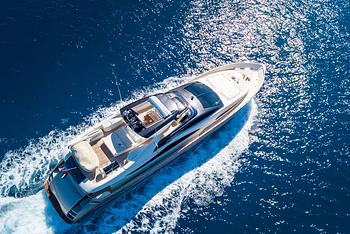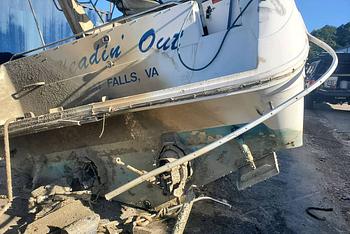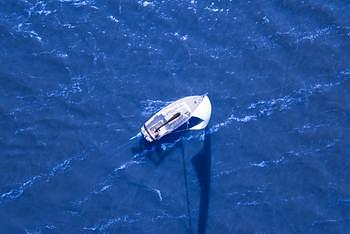This guide covers every aspect of how to buy a used boat, including finding, evaluating, and purchasing the right boat. It will give you a blueprint—and the confidence—to navigate listings, assess the condition, arrange inspections, and handle essential paperwork, helping you make a smart and informed purchase on the way to getting the best possible deal.
Why Consider Buying a Pre-Owned Boat?
Buying a pre-owned boat can be a smart and rewarding decision for both first-time buyers and seasoned boaters. One of the most compelling reasons to consider buying a used boat is the initial purchase cost savings. New boats depreciate rapidly (40 to 50 percent of their initial price over the first 8 to 10 years, with half that amount lost in the first two to three years). Used boats on the other hand generally depreciate around 5 percent each year. This offers more value for money and may mean you can afford to buy a higher-end model for the same or less price.
In addition to affordability, pre-owned boats often come with valuable upgrades and accessories already installed, such as GPS systems, marine radios, or custom covers that might otherwise be costly to add to a new boat. Safety equipment, watersports gear, even galley appliances or utensils can sometimes be negotiated into the purchase price.
Finally, pre-owned boats have a performance track record. You can read user reviews, check maintenance history, and speak with previous owners to get a clear understanding of how a boat holds up over time. Ultimately, a used boat can offer reliability, functionality, and fun without the premium price tag.
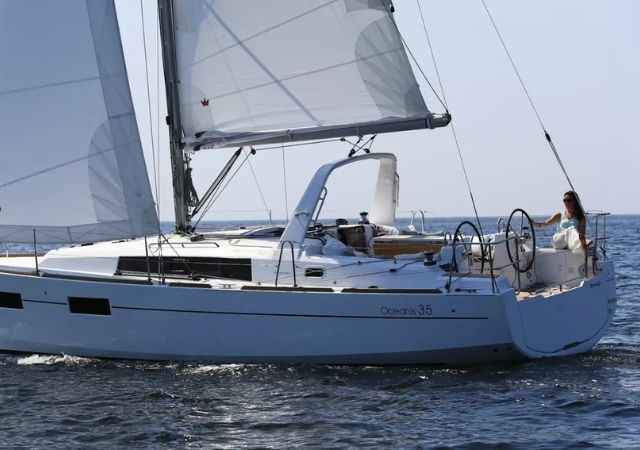
Pros and Cons of Buying a Used Boat
There are many benefits to buying a used boat including;
- You get good value-for-money
- You can negotiate the price with the vendor
- You get your boat immediately rather than waiting a long time for a new-build
- You can often get a better model for the same or less money
- You will often get additional equipment included in the price
- Used boats have a performance track record
Some possible downsides to buying a used boat include;
- You’re unlikely to get a full warranty
- You can’t customize your boat as it’s being built
- Maintenance costs may be higher
- Installed technology may need updating
How to Buy a Used Boat Checklist: Research Phase
This three-part checklist will help you navigate the process of buying a used boat, from initial research, through to sea trials and marine surveys, boat financing options, and arranging the paperwork for buying a used boat.
-
Initial research
Once you’ve decided to buy a used boat it can feel both exciting and daunting at the same time. Take your time to first identify the best used boats to buy that suit you, what the costs will be, and where to start looking.
-
Define your needs
Ask yourself questions such as What do I want to do with my boat? and Where do I want to use my boat? This is perhaps the most important step as it will impact the style of the boat you buy. Do you want it for fishing, watersports or entertaining? Do you need a versatile boat that allows for different activities and overnight trips? Are you planning on long-range cruising? Will your boat live in a marina or on a trailer? Also consider where you will use your boat. Lakes, open oceans, tropical waters, or regions with more defined seasons can all play a part in helping you choose the right type of boat.
Expert Tip: When deciding on the right type of boat to buy, be realistic about your boating experience. While skills will be learned along the way, you’ll get more enjoyment and avoid overwhelm with an easier-to-handle model to start.
-
Determine your budget
Buying a boat is a big financial decision which goes beyond the initial purchase price, so it’s important to budget realistically for the long-term.
Initial costs include;
- Purchase cost: The sale price will be affected a boat’s size, age, location, style, and condition. Use the search tools on boat-selling websites such as Rightboat.com to see what’s available in your area and get a good idea of the prices. If you choose to use a loan or marine financing, you can spread out the initial cost of the boat over months or years. Find out more about boat financing options in our detailed guide.
- Survey and sea trial: Depending on the size of the boat you’re buying, you’ll likely to need a boat survey and sea trial, which is paid for by the buyer. More on this below.
- Trailer: If you plan to tow your boat to launch sites, you’ll need a trailer. Some used boats will be sold with their trailers so this can often be negotiated into the price.
- Equipment: You’ll need to make sure your boat has up-to-date safety equipment on board including life jackets, paddles, horn, personal locator beacons, EPIRB, marine radio, fire extinguishers and signal flares. There may also be other equipment such as fishing gear or watersports equipment you’ll want to buy.
- Licenses: An increasing number of US states require you to have completed a boater safety course and get a boating license to operate your boat. Find out more with our Guide to Boating Licenses.
- Boat registration: When it comes to boat registration and titling fees, each state has its own requirements. The cost will depend on the size of the boat and its class.
Annual used boat ownership costs include;
- Marina fees: If you can’t trailer your boat, marina fees are likely to be one of your largest annual expenses. Prices vary significantly depending on location, amenities available, and the size of your boat.
- Insurance: You’ll need at least a basic level of insurance on your boat, and the costs will vary depending on size, style, age, location, where your boat is stored, where it’s used, your level of boat-handling experience, your boat-driving record and the deductible you choose.
- Fuel: You can calculate roughly how much gas or diesel fuel will cost depending on how much you plan to use it. The size of the engine, your typical cruising speed, the hull type, and the type of fuel will all play a part.
- Maintenance and repairs: Create a maintenance schedule from the start and not only will there be fewer unpleasant financial surprises along the way, but your boat will stay in better condition, too. Costs will vary depending on whether you do the work yourself or pay professionals.
- Depreciation: Well-maintained used boats generally depreciate around 5 percent each year.
-
Research models and check market prices
Today boat buyers have more tools than ever to use in their search for the perfect boat, and they aren’t limited to classified ads. Search tools include:
- Boat-sales websites: Websites such as Rightboat.com offer you the chance to conduct a detailed specific search by entering in the type and style of boat you’re looking for, the make and model, the length, location and desired price level. You’ll instantly be able to look through detailed photographs and videos, see full specifications, and make contact with the private seller, dealer or broker.
- Boat brokers and dealers: Most brokers and dealers sell both new and used boats, and they may sell a wide range of brands and models, or specialize with one or two brands. Working with a broker can offer reassurance, as they are experts in their field and often know the boats they’re selling inside out.
- Visit a local boat show: There are hundreds of boat shows annually across the world, from local and regional shows to famous international events such as the Miami International Boat Show—and we featured 20 Boat Shows Around the Worldin this article.) Visiting a show allows you to see the latest models up close, compare similar boats, and sometimes go for a sea trial. For more information, read our article Should I Buy a Boat at a Boat Show?
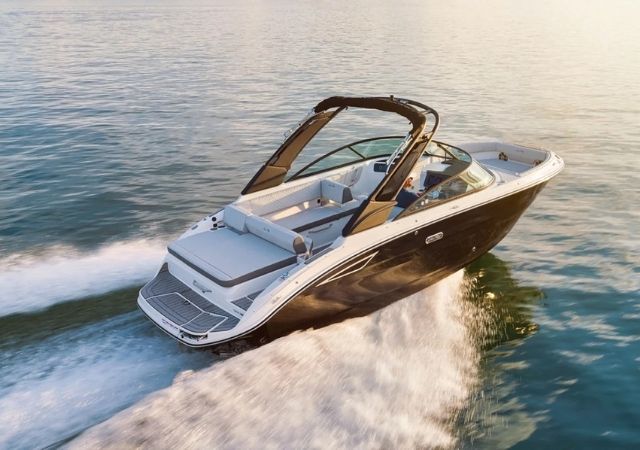
How-to-Buy-a-Used-Boat Checklist: Trial & Survey Phase
-
Inspection essentials
Once you have a short-list of boats that tick all your boxes, use the contact forms to get in touch with the brokers or private sellers directly to arrange a viewing. The initial viewing is the first step in deciding whether to buy a particular boat, so go armed with a used boat buying checklist to help you remember everything. Whether you conduct a marine survey or not, the initial viewing is where you can get a good feel for the condition and suitability of the boat. Things to look out for include;
- Layout: Spend time first getting a feel for the layout and space available. Is the cabin configuration right? Are the social spaces how you’d imagined? Is there enough deck space?
- Hull and deck: Look for cracks, blisters, or signs of repairs.
- Engine and mechanical systems: Check for corrosion, leaks, and maintenance history.
- Electrical systems: Test all electronics, lights, and battery condition.
- Interior condition: Assess upholstery, flooring, and fixtures.
- Safety equipment: Ensure all required safety gear is present and functional.
-
Sea trial
Irrelevant of whether you’re having a marine survey or not we highly recommend conducting a sea trial as it’s both a way to get a feel for the handling and suitability of the boat, but also its mechanical condition. A sea trial allows you to conduct;
- Performance checks: Observe handling, acceleration, and noise levels.
- System functionality: Test steering, throttle, and navigation systems.
- Comfort assessment: Evaluate ride comfort and ergonomics.
-
Marine survey for used boats
Getting a marine survey done on a boat you’re potentially going to buy is an important and worthwhile investment. Even those with good working knowledge of boats commission pre-purchase surveys (also known as Buyer’s Report or a Full Condition Survey) to ensure there are no underlying issues. It is also likely that an insurance company will ask to see the report before issuing cover.
An expert surveyor will inspect the boat thoroughly, usually whilst out of the water, to ensure the structural integrity of the vessel as well as the electronic systems and safety equipment.
- What a marine survey covers: A marine surveyor will undertake a thorough check of the boat from the bottom up. It is a surveyor’s job to identify areas which are either unsafe or may cost you money in the future. They do not give a personal opinion on whether you should buy a boat, but rather compile a detailed, factual report from which you can base your own decisions on how to proceed with the sale. The report will include descriptions of the vessel and the systems on board, any findings given in descending importance, the overall condition of the boat, and a market value.
- Cost of marine survey: The survey is commissioned by the buyer once they have had an offer (subject to survey) accepted on a boat. The buyer foots the bill for the report. Costs vary hugely depending on the type and size of the boat, the location, and the type of marine survey you commission. The survey will usually take a whole day, longer for very large boats, and the report will take a further few days to compile.
- Finding a marine surveyor: Choose the surveyor carefully and be prepared to wait a few days for the one you want. You will need to liaise with the seller or their broker as the boat may have to be taken out of the water. Choose a surveyor that is registered with an official surveying organization such as the Society of Accredited Marine Surveyors (SAMS) or the National Association of Marine Surveyors (NAMS). For more read our detailed guide to Getting a Boat Survey.
How-to-Buy-a-Used-Boat Checklist: The Purchase
-
Negotiating boat price
No-one wants to pay any more for a boat than they have to, and there are many factors to take into account when negotiating the final price. Things to consider when talking to a vendor or broker include:
- Do your research: Know the true value of the boat by comparing it with other similar models and take these along with you.
- Use survey rindings: Leverage any findings from a marine survey to get the price lowered. Getting quotes for maintenance or repairs of any issues can be helpful.
- Don’t be swayed by a long list ofeEquipment: While this can be enticing, keep in mind that a lot of equipment will likely need replacing so try and focus on the boat itself.
- Try not to be emotional: Try and leave your emotions outside and focus on figures and facts. When a seller or broker knows you’re passionate about a boat you’ll be on the back foot when it comes to negotiating. Set yourself a maximum figure you’re willing to pay and be willing to walk away.
- Be patient: Buying a boat can be a long process. Don’t get down, because that’s when poor decisions are made. Be prepared for several rounds of offers and counter-offers, and keep in mind the seller will typically be keener to sell than you are to buy.
- Negotiate on extras: If you find yourself at a stalemate in price negotiations consider asking for extras which would otherwise cost you money. Examples include trailers, safety equipment, soft furnishings, or hard standing storage for the rest of the season.
-
Boat financing options
Financing a boat is as common as mortgaging a house or financing a car, and the process works in a very similar way. It’s a simple equation of calculating what’s affordable, and what type of boat you can get for your monthly payments. Different lenders will have different criteria, which is why a broker can be invaluable in finding the best lender for your situation. Your credit rating, the size of your deposit, the type of boat you wish to buy, and the reason you want to (do you want to live on it, for example) will all come into play. What you pay each month will ultimately depend on:
- Deposit: This figure is often around 15% to 20% of the loan amount, but will depend on the age, size, type and use of the boat. You’re likely to get a lower interest rate for a higher down payment or shorter loan term. Be sure to include the down payment in your initial costs.
- Loan term: The average loan term is 10 years but this can vary, and your monthly repayments will be higher, the shorter the term you select.
- Interest rate: Marine mortgage lenders offer a choice of fixed-rate simple interest loans, or variable rate loans. Be sure to check how long the rate is fixed for, as it is usually a set number of years. Interest rates change regularly, and are different in each country, but you can expect to be working with rates in the region of 3% to 8% APR.
- Loan type: There are two types of marine mortgage loans; secured and unsecured. A secured loan requires collateral as security, and in the case of buying a boat, the boat itself would be the collateral. If you didn’t pay your monthly installments, the lender could repossess the boat. Secured loans usually come with lower interest rates and higher lending limits as there is less risk to the lender. A home equity loan uses your house as collateral and is essentially like a second mortgage.
An unsecured loan doesn’t require collateral, which means that there is no risk to you losing your boat if you can’t pay your monthly loan repayments. It would affect your credit score though. As there is more risk to the lender, however, lending limits are lower and interest rates higher. It does mean you are free to use the loan money as you wish, which might include equipment for the boat, repairs or a trailer.
-
Paperwork for buying a boat
As with buying a car, there is some paperwork that goes into how to buy a used boat.. Paperwork and taxes for buying boats will be different all over the world, and in the United States, each state will have slightly different requirements but the following are usually included:
- Title and Registration: A boat title is ultimately a legal document that proves ownership. In the US, boat titles are issued by each state (although not all states require them), and whenever a boat is bought or sold, a new one will be issued to the new owner. In the US, a few states don’t require boat titles but instead ask for a boat registration. In fact, most boats require a registration whether they have a title or not. All engine-powered boats will need to be registered with a state boating agency or with the federal government. You’ll be issued with a registration number that must be displayed on both sides of the bow. It needs to be updated every year or two.
- Bill of Sale: The bill of sale—also known as the Boat Purchase Agreement—is an important document you’ll have to sign. It’s the transaction between you, the buyer, and the seller. While a Bill of Sale isn’t legally required in all states in the US, it’s a good idea to ask for one as evidence of the transaction. A Bill of Sale will include:
- A description of the boat including the hull identification number (HIN)*, brand, model, year of manufacture, length, and any electronics or accessories that are included in the sale. If the boat has an outboard motor, it should be listed separately with its serial number.
- The purchase date
- The sale price
- The signatures of both seller and buyer
- The name, address, and contact information of both buyer and seller
- The state registration number
- Trailer Vehicle Identification Number (VIN) if it’s being sold with the boat
- Insurance: Boat insurance isn’t legally required in all states, however, it is required by most finance lenders and marinas, plus it is a sound idea to have it. Boat insurance can be purchased the same way as car insurance, with policy costs depending on the size and type of boat, its location and where it's used, and its price.
- Maintenance Records and Warranty Cards: If the used boat is still within its warranty, make sure the owner passes the warranty documents to you. Likewise, maintenance records that detail the condition of the boat, what repairs have been made, when, and by whom are also useful to have.
- Taxes and Fees: In the US there is no federal tax imposed when buying a boat. However, there will often be taxes by US states depending on where you buy the boat, where you keep it, and where you use it. Taxes may include;
- Sales Tax: Most states impose a sales tax, and rates vary. While some states such as Delaware and Oregon don’t have sales tax on boats, others such as Florida and New Jersey have a flat rate sales tax—often between around three and six percent—and some also have a cap on sales tax. There may also be a small amount of local or municipal sales tax added on, too.
- Use Tax: This relates to where you keep and use your boat. If you buy your boat in one state, and pay sales tax there, you shouldn’t have to pay any use tax if you keep it and use it in another state. Use tax is also around five percent but varies.
- Property Tax: In most states annual personal property tax will need to be paid in addition to sales or use tax.
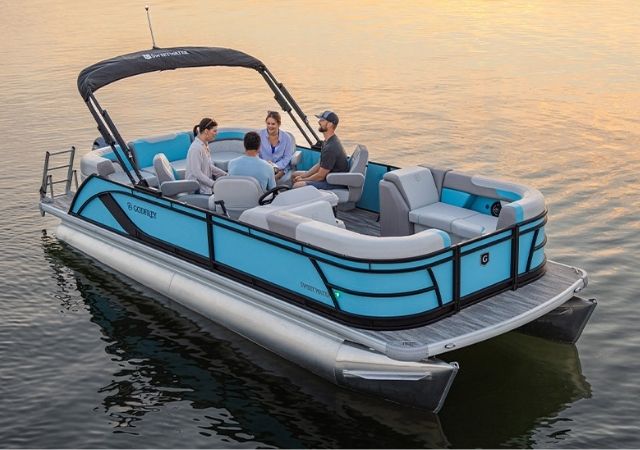
Tips for How to Buy a Used Boat
Check out some of our top tips for finding and buying the best used boat for the best price.
- Buy Off-Season: Buying off-season means there is usually less demand on used boats and you may be able to negotiate a better price or have more choice.
- Use Reputable Sellers: Reputable brokers and sellers, such as those listing boats on Rightboat.com, will make your experience safe, easy, and enjoyable.
- Avoid Impulse Decisions: Take the time to evaluate your options thoroughly.
- Consult Experts: Seek advice from experienced boaters or professionals.
Frequently Asked Questions (FAQ)
Q1: What is the best time of year to buy a used boat?
Late autumn and winter often offer better deals as demand decreases and, in seasonal locations, owners face the cost of laying up their boats for the off-season.
Q2: How do I verify a used boat's history?
Request maintenance records, conduct a marine survey, and check for any liens or outstanding debts.
Q3: Can I finance a used boat purchase?
Yes, many lenders offer financing options specifically for used boats.
Q4: What should I look for during a sea trial?
Assess the boat's handling, engine performance, and check all onboard systems for functionality.
Q5: Do I need insurance for a used boat?
While not always legally required, insurance is highly recommended to protect your investment.


